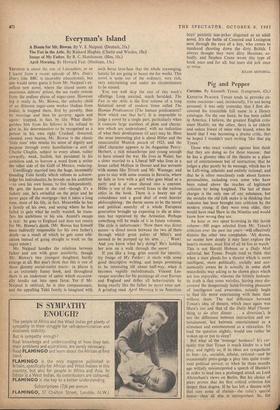Everyman's Island
A House for Mr. Biswas. By V. S. Naipaul. (Deutsch, 21s.)
April Morning. By Howard Fast. (Methuen, 15s.)
TRINIDAD is about the size of Lancashire, or so I learnt from a recent episode of Mrs. Dale's Diary (the BBC is incurably educational), but one would never guess it from Mr. Naipaul's ex- cellent new novel, where the island seems an enormous debtors' prison, the sea vastly remote from the endless plains of sugar-cane. However big it really is, Mr. Biswas, the unlucky child of an illiterate sugar-cane worker (Indian from India), is trapped there, first by poverty, then by marriage and then by poverty, again and again: trapped, in fact, by life. What distin- guishes him from his fellows is his refusal to give in, his determination to be recognised as a person in his own right. Crushed, thwarted, cheated, even beaten, Mr. Biswas is the classic `little man' who retains his sense of dignity and purpose through every humiliation—a sort of Charlie Chaplin, subject to every abuse, rather cowardly, weak, foolish, but persistent in his ambition and, to borrow a word from a writer the other side of the Gulf of Mexico, enduring.
Unwillingly married intq the huge, incessantly breeding Tulsi family which refuses to acknow- ledge his individuality, he broods on his ambition —to own his own house, to live independently. He gets the house in the end—though it's a rickety one, he's swindled on the price and he never pays off the mortgage—but it takes a long time, most of his life, in fact. Meanwhile he has a family of his own, and seeing where he has failed to gain what he really wanted, he trans- fers his ambitions to his son. Anand's escape is real: he goes to England and does not return for Mr. Biswas's death. (Mr. Biswas has himself been indirectly responsible for his own father's death—as a result of which he gets some edu- cation instead of going straight to work on the sugar estate.) Mr. Naipaul handles the relations between father and son with great sensitivity, though Mr. Biswas's two youngest daughters hardly emerge at all. But don't think that this is one of those gloomy social-realist tracts: in places it is an extremely funny book, and throughout there is an undertone of satire which occasion- ally breaks out into open farce. Yet if Mr. Naipaul is satirical, he is also compassionate, and the appalling Tulsi family is imagined with such fierce love-hate that the whole scavenging, lunatic lot are going to haunt me for weeks. This novel is quite out of the ordinary, very rich, very entertaining and under no circumstances to be missed.
You can well skip the rest of this week's offerings. Long awaited, much heralded, The Fox in the Attic is the first volume of a long historical novel of modern times called The Human Predicament (The human predicament? Now which can that be?). It is impossible to judge a novel by a single part, particularly when it contains large numbers of plots and charac- ters which are undeveloped, with no indication of what their development (if any) may be. Here the most interesting plot is about Hitler and the unsuccessful Munich putsch of 1923, and the chief character appears to be Augustine Penry- Herbert, a rich misanthrope just young enough to have missed the war. He lives in Wales; has a sister married to a Liberal MP who lives in a house called Mellton in Dorset and has servants with names like Trivett and Mr. Wantage; and goes to stay with some cousins in Bavaria, where he falls in love with a girl who goes blind at a party and is at once shoved into a convent. Hitler is one of the several foxes in the various attics in the book. There is a heavy use of coincidence and a good deal of even heavier philosophising: the theme seems to be the moral and political anarchy of a whole European generation brought up expecting to die at nine- teen but reprieved by the Armistice. Perhaps something will be made of it in future volumes. The style is unfortunate: 'Now there was direct access—a direct union between the two of them through which great pulses of Mitzi's soul seemed to be pumped up his arm. . . .' Wow! And you know what he's doing? He's holding her arm on a walk through the snow!
If you like a long, grim search for identity, try Image of My Father: it starts with some good descriptive writing, and keeps promising to be interesting till about half-way, when it becomes vapidly melodramatic. Vincent Les- vesque searches for his parentage all over Europe and England and defies all behaviourists by being exactly like the father he never even saw. A grinding read. April Morning is an American boys' patriotic tear-jerker disguised as an adult novel. It's the battle of Concord and Lexington seen through the eyes of a boy, who comes to manhood shooting down the dirty British. I always thought they were dirty Hessians, ac- tually, and Stephen Crane wrote this type of book once and for all, but tears did jerk once or twice.
JULIAN MITCHELL














































 Previous page
Previous page